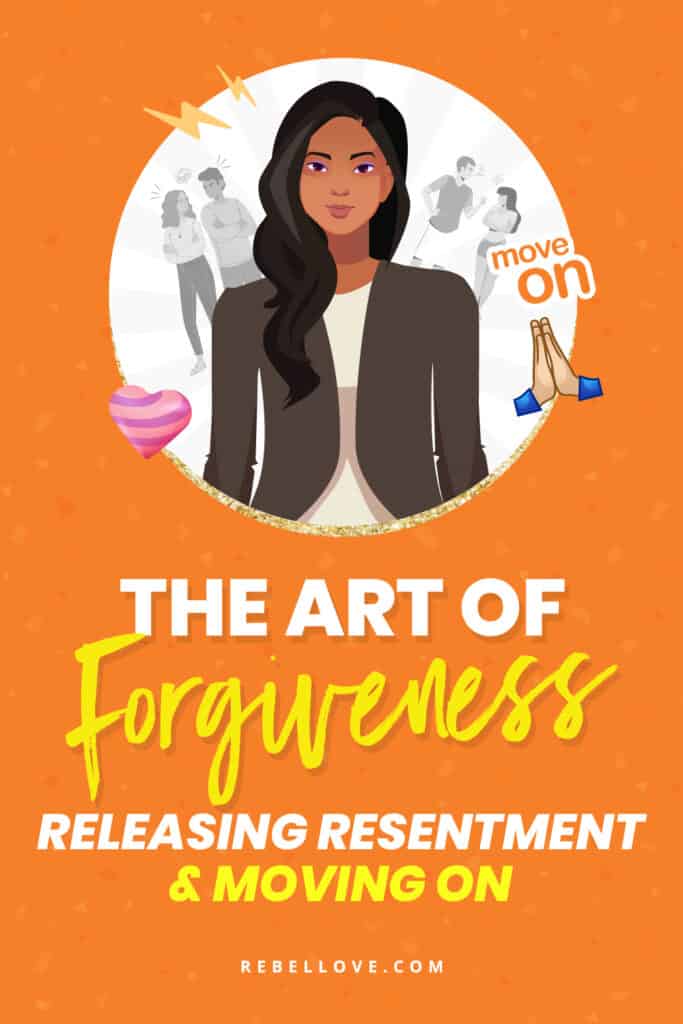This post may contain affiliate links and Rebel Love may be compensated for purchases visitors make through these links. We only promote products and services we really care about and that we think are useful. Read the full policy here.
When you hear the word “closure”, what comes to mind?
For me, I envision an idealistic end to a meaningful relationship. Everything has been laid out in the open, responsibilities have been assumed in the right places, and, reaching a mutual level of understanding, both people part ways free of regret.
I did say idealistic, not realistic.
From my experience, breakups don’t run so smoothly. High emotions tend to equal high stakes, and the brain has this funny way of remembering only the good, and you seem to want your ex to:
💔 Beg for you to stay;
💔 Take the blame for the loss, correcting all the wrongs so the relationship can workout itself out.
I’ve watched friends and family members make desperate attempts at salvaging unfulfilling partnerships in the name of fear and familiarity. I have also been this person, and I have to say, there’s so much more to life than a mediocre romantic relationship.
I spent six years with a man prior to my marriage with James. That breakup was the most harrowing experience of my life. In retrospect, I now understand the missing element that, had I focussed on it – leaned into it – would have saved me hours of suffering.
That element: forgiveness.
You’ve probably heard the cliche: Forgiveness is, above all, for the self.
Dare I quote Oprah:
Forgiveness is giving up the hope that the past could have been any different, but we cannot move forward if we’re still holding onto the pain of that past and wishing it was something else.
– Oprah
Personally, forgiveness was unreachable, because I was drowning in anger, resentment, blame, and toxic shame. Anger, although a necessary emotion, when not transitioned out of properly, can anchor us in a deep sea of resentment and negative emotion. I was convinced that all the damage caused, the destruction of my self-esteem, and the peace of mind I lacked was the fault of my ex. Resentment became my home, my resting ground; I dug roots there, and as a result, it slowly ate me alive.
Don’t get me wrong:
Forgiveness is not about condoning or even forgetting about the things that occurred; rather, it’s there to help us release ourselves from the burden of our anger, of that resentment.
Forgiveness is critical in the process of heartbreak recovery because it especially encourages us to acknowledge and process our emotions, ultimately finding acceptance and (yes!) closure. It gives us a bird ‘ s-eye view of our situation, allowing us to take our power back because we can begin to identify our own mistakes and shortcomings, how our blindspots played a role in our hurt, and how not to repeat that process.
Yes, forgiveness takes time, practice, and self-reflection, but in that, we open ourselves back up to new possibilities of love and happiness.
The Blame Game
Also, I want to acknowledge that sometimes there is no such thing as being right or wrong. On occasion, we simply pair ourselves with an incongruent puzzle piece and ignore the differing shapes for a multitude of personal reasons. We each come into relationships with different histories, family dynamics, value systems, insecurities, strengths, and weaknesses – all of which don’t always cooperate with one another. Sometimes, so much so, that things fall apart completely.
Forgiveness, then, is our roadmap out of the rubble and back to ourselves; back to joy and love. Today I wanted to share that roadmap with you, so you too can cut the anchor that’s keeping you stuck, make your way back up to the surface, and begin to breathe a little easier.
The Art of Forgiveness: Releasing Resentment and Moving On
1. You Have to Feel

This isn’t going to be a popular first step, but feeling your stuff is the only way to overcome it. Emotions are a valid and natural response to our experiences! Suppressing or ignoring them can lead to an emotional buildup, which can manifest in other ways (e.g., body pain, anxiety, depression, unhealthy coping mechanisms, etc.) and prolong the healing process.
After my breakup, I used alcohol and one-night stands to cope with my low self-esteem. Alcohol masked the pain, and one-night stands made me feel wanted in the short term. This probably comes as no surprise, but I always woke up feeling worse than the day before. My rock bottom came at the bottom of a bottle, a one-night stand, and a broken ankle – both of which I had no memory of. I knew I had a choice to make: start confronting my feelings, or continue down the path of high-risk behavior…
I didn’t want to see how the second option would end, so I started leaning into my feelings.
2. Practice Self-Compassion
Practicing self-compassion may look differently to different people. Fundamentally, it involves being kind to oneself through words, thoughts, and actions. This may include things like:
🧡 Common humanity: Recognizing that suffering and difficulties are a part of the human experience, and rather than isolating yourself, remember that you are not alone; that others have faced similar challenges.
🧡 Self-care: The action of taking care of your physical, emotional, and mental well-being. This includes the basics like nourishing the body through food, water, sleep, and sun, as well as participating in activities that replenish you and connect you to others.
🧡 Self-acceptance: The practice of accepting yourself as you are in the present moment – your strengths and your imperfections. It’s about embracing your humanness and letting go of the need for perfection.
🧡 Boundaries: Practicing self-advocacy is a form of self-compassion that involves protecting oneself and one’s needs. Through boundaries, you prioritize your well-being and honor your values.
One method that had a great impact on me, and was the catalyst to my self-compassion, was inner-child visualization. In short, I closed my eyes and imagined myself as a child. I pictured myself speaking to my child-self, asking them how they are feeling and what they need from me. I then went on to apologize for the lack of love and maltreatment. My child-self then forgave me for my mistakes.
At the end of that practice, I was a puddle of tears, and felt so much lighter. I still use this method when I can feel my self-compassion dwindling.
3. Acceptance and Letting Go
After a breakup, it’s important to take time to accept that the relationship has ended and that you cannot change the past. Forgiveness includes letting go of any expectations or fantasies about getting back together with your ex. This is also the moment you must remind yourself that holding onto anger and resentment will only prolong your pain.
Remember:
Holding onto anger is like drinking poison and expecting the other person to die.
…in other words, only you suffer the consequences.
4. Perspective Shift

When I started down the road of forgiveness after my breakup, I began to see my ex in a different light. He was a human with his own baggage, insecurities, and pain. Although the projection of these things hurt our relationship, I was starting to understand why they existed in the first place. His father wasn’t the most loving man, in fact, I witnessed him bully my ex on numerous occasions. My ex was made to feel small and unintelligent. Because of this, he had to make up for that lack of confidence in other places – getting into physical altercations, having affairs with other women, his need to be as fit/muscular as possible. This is not an excuse for bad behavior; however, when we can understand the life experience of another person, and see how they cope with the negatives, it gives us insight into whether that person should occupy space in our lives.
For me, recognizing that allowed me to see the breakup as an opportunity for my own growth and self-discovery.
Why was I so willing to put up with these behaviors for so long?
What was missing in me to be so accepting of this?
Take time to reflect on mistakes, lapses in judgment, and lessons learned from your relationship and how those things have shaped you. What is the next step to ensure you grow from those things?
5. Practice Empathy
Empathy is a beautiful thing. It’s the ability to understand and share feelings, thoughts, and experiences with others. It’s the “walk in another person’s shoes” emotion. I gave an example of empathy above by understanding my ex’s past and complicated relationship with his father. Seeing the person and their struggle humanizes them and, although it doesn’t mean you need to stay with them or put up with their behavior, you can find a place in your heart to have compassion for the pain they carry.
What self-compassion is for the self, empathy is for the other. Empathy is important because it dilutes anger and resentment; it reminds us that our ex is also human, having a human experience, and they’re doing the best they can with what they have. This removes the right vs. wrong dynamic because it sheds light on the fact that we’re all coming into these relationships with different lenses and filters.
6. Set Boundaries
As mentioned, setting and upholding boundaries is an act of self-compassion. If you need space or time to heal after your breakup, communicate this to your ex, friends, family, etc. This can help you create a sense of safety and protect your emotional well-being.
After my breakup, one boundary I set with my friends was that I didn’t want to hear anything about my ex. I came from a small town, so my friends would see him out at times with other people, and I was not strong enough to receive those details. If a friend disrespected this boundary, I distanced myself from them.
When we set and maintain boundaries, we are saying yes to our own mental health and well-being.
7. Seek Support
During this time, it’s critical you surround yourself with a supportive network of friends and family who can provide comfort and guidance. It may also be worth joining a support group or seeking a therapist to help you navigate the breakup, anger and resentment, and this process of forgiveness.
8. Practice Self-Forgiveness (Create Rituals)
Remember, forgiveness, above all, is for the self. You cannot move along in life until you’ve let go of the pain of the past. The last thing to do is to come back to this roadmap as often as you need.
My advice?
Set up a forgiveness ritual. This can include a weekly practice of inner-child visualization. Perhaps you write letters of forgiveness to your ex (even if you don’t send them) or take up a journaling practice to help clear out your emotional closet.
Forgiveness rituals will help you release any residual negative emotions and cultivate forgiveness.
Forgiveness is a Personal Journey

Heartbreak recovery will look different to different people. The art of forgiveness and releasing resentment may vary in time and intensity, depending on where you are in your journey, and the specifics of the ended relationship. This process will take time and persistence; it’s a practice, not a one-time course. Certain steps will bear repeating and may evolve as time passes. In other words, methods that work today may not be the best for you down the road, so switching it up is good!
There is no deadline nor an expiration date on this kind of work, so be patient and kind to yourself (aka, self-compassion).
Lastly…
It’s through the processing of pain that we tend to learn the most about ourselves, and the power we hold. We find out who we are, what we need, and where the gaps are between those things. Neither breakups nor romantic love are prerequisites for this kind of self-work; however, I know from experience, that through the loss of love, we can learn what it means to be whole. Do not underestimate yourself or the power of small, consistent action of self-love. It is through persistent, incremental steps that we tend to unlock our greatest potential.
As someone who has suffered in love, I promise that if you give yourself a chance, you’ll see that the possibilities for connection and joy are endless.
Until next time…
Quean Mo xx